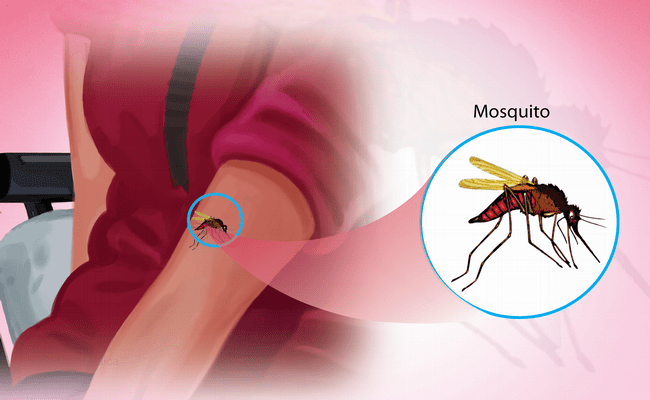Malaria Disease: Test, Complications, Prevention and Management
What is Malaria Disease?
Malaria disease is a life-threatening disease which is caused by the Plasmodium parasite. This type of disease is transmitted to humans by the bite of an infected female Anopheles mosquito.

Test and Diagnosis of Malaria Disease:
Some important tests must be done to diagnose malaria disease, those are in the following:
- Blood test for malarial parasites,
- Well, stained thick and thin blood films seen under the microscope,
- Repeat if necessary.
- Buffy coat test of Leishman stained smear of anti-coagulant blood. See the different stages of erythrocytic schizogony and also gametocyte of the plasmodium serological tests:
- An immune- diagnostic test,
- A molecular diagnostic test,
- Liver function test,
- CSF test.
Management of Malaria Disease:
In case of severe malaria or cerebral malaria:
- Loading dose: Quinine Dihydrochloride- 20mg/kg weight by IV infusion over four hours.
- Maintenance dose: after 8hours.
- Quinine salt: 10mg/kg body weight over 4hrs by IV infusion.
- The maintenance dose should be continued 8hourly until the patient can swallow the tab to complete the 7days course.
- Fansidar: single dose on the third day.
- Primaquine: single dose on the fourth day.
General Management:
It includes-
- Bed rest,
- Paracetamol 500mg t.d. after the meal,
- Icecap and cold sponging,
- Adequate diet and fluid should be given.
Complications of Malaria Disease:
Complications of Malaria Due to P. Falciparum:
It includes-
- Cerebral malaria with edema,
- Hyperpyrexia,
- Severe anemia (hemolytic),
- Intravascular hemolysis- blackwater fever,
- Hypoglycemia, especially with quinine treatment,
- Septicemia secondary to shock,
- Hypotensive shock,
- Metabolic acidosis,
- Splenic rupture,
- In pregnancy- Maternal death, abortion stillbirth, low birth weight,
- Organ damage due to anoxia-
- It includes-
- Brain: confusion, coma,
- Kidneys: oliguria, uremia (acute tubular necrosis),
- Lungs: a cough, pulmonary oedema,
- Heart: cardiac dysrhythmias,
- Intestine: diarrhea, congestion, possibly leaky to bacteria,
- Liver: acute hepatopathy, jaundice, encephalopathy,
- Adrenal: adrenal insufficiency-like syndrome.
Complications of Malaria Due to P. Malaria:
It includes-
- Glomerulonephritis,
- Nephrotic syndrome in children.
Prevention of Malaria Disease:
All the preventive ways for malaria disease have deeply discussed in the following:
a. Personal Protection Measures:
It includes-
Destruction of Vector Mosquitos on the Spot:
Space spraying with 0.4% solution of pyrethrum 25% in kerosene’s very convenient for the protection of the individuals at home.
Protection against Mosquito Bites:
Screening of house- Mosquito proofing of dwellings has been a very effective method.
Use of Repellent:
Commonly used synthetic repellents are Rutgers-612, and alone, dimethyl phthalate (SMP), Dibutyl phthalate (DBP), Diethyltoluamide (DET).
Bed Net or Mosquito Net:
T is still one of the most effective measures of personal protection.
Use of Insecticide Impregnated Bed Net:
E.g. deltamethrin
b. Vector Control Measures:
It includes-
- Environment Management (Source Reduction):
- Filling of small water collection abandoned ditches burrow pits, ponds, etc.
- Drainage to remove wanted water from the land surface of the subsoil drain.
- Biological Method:
- E.g. by Carnivorous fish Gambusiaffins, Lebistes reticulates (guppy) annual fish.
Chemical Control:
It includes-
- Indoor residual spraying external space treatment,
- Larvicidal methods.
c. Anti-parasite Measures:
It includes-
Presumptive Treatment (Before the result of blood slide exam):
- Chloroquine & Primaquine (P. falciparum sensitive areas),
- Fansider & primaquine (P. falciparum resistant areas).
Radical Treatment:
- Chloroquine & Primaquine (P. falciparum sensitive areas),
- Fansider & primaquine (P. falciparum resistant areas).
More questions related to this article:
- What do you mean by malaria disease?
- Define malaria disease.
- What are the conformational tests for malaria disease?
- What are the tests for diagnosing malaria disease?
- List some common tests for diagnosing malaria disease.
- How to manage malaria disease?
- Describe the management process of malaria disease.
- Explain the medical management of malaria disease.
- Describe the general management of malaria disease.
- What are the common complications of malaria disease?
- What are the fatal complications of malaria disease?
- Mention some key preventive measures of malaria disease.
- How to prevent malaria disease?
- Describe the preventive measures of malaria disease.

Maria Khatun Mona is a Founder and Editor of Nursing Exercise Blog. She is a Nursing and Midwifery Expert. Currently she is working as a Registered Nurse at Evercare Hospital, Dhaka, Bangladesh. She has great passion in writing different articles on Nursing and Midwifery. Mail her at “maria.mona023@gmail.com”
